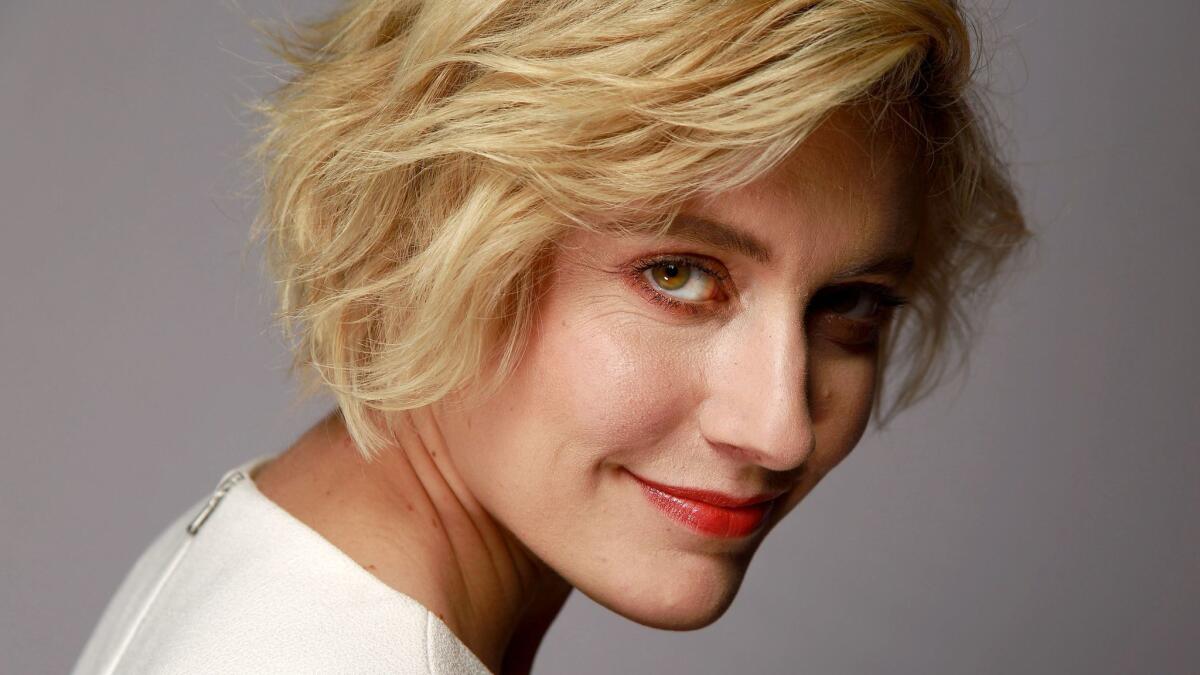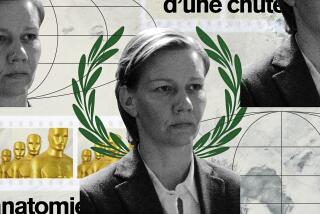As Hollywood struggles with inclusion and sexism, the Golden Globes are being parsed with Oscar-like intensity

There was a time when the Golden Globes nominations were taken seriously only as potential Oscar indicators.
If the Hollywood Foreign Press Assn. decided to give a corny, crowd-pleasing musical like “The Greatest Showman” more nominations than a culturally relevant satire like “Get Out,” or ignore female directors in the middle of the #MeToo moment, it would be seen as just another quirky misstep by a group known more for taking selfies with stars than its taste-making abilities.
But not this year. After two years of #OscarsSoWhite, and as prominent men step down amid sexual misconduct allegations from all levels of the entertainment industry, nomination slates are being parsed not just for the names but inclusion and cultural messaging.
Including the Globes. With a sheen of credibility that has come — deserved or not — in recent years, the choices of HFPA’s 89 voters are now dissected a bit more seriously. And when this year’s were announced on Monday, critics on social media found some of the HFPA’s choices baffling.
The exclusion of Jordan Peele and Greta Gerwig from the director category sparked the loudest reaction, both from social and mainstream media, especially since one of the slots was occupied by Ridley Scott.
Globes voters may have indeed loved Scott’s thriller “All the Money in the World” and the fact that Scott managed to replace Kevin Spacey with Christopher Plummer in his already finished movie and still made his Christmas release date. Or perhaps they loved the fact that they are the only voting group to see the movie.
But if the group is merely saluting the effort Scott made in excising Spacey following multiple allegations of sexual misconduct against the actor, then it came at the expense of Gerwig, an awards season front-runner for the lovely “Lady Bird,” the rare movie love story centered on a mother and daughter.
The decision also could have come at the expense of Dee Rees, director of the acclaimed “Mudbound,” a nuanced social drama about prejudice in the Mississippi Delta, or Patty Jenkins, whose dazzling “Wonder Woman” upended the superhero genre in several important ways.
“It seems like they keep pushing the finish line for women,” said Melissa Silverstein, founder and publisher of Women and Hollywood, an advocacy website for gender equity in the film industry.
“You see women like Greta Gerwig and Dee Rees and Patty Jenkins winning a lot of awards, but then the momentum dies. And that’s discouraging because there are a lot of opportunities this year for women to be seen in a different way.”
“Every year, I think, ‘Hey, where’s this woman or that woman?’ But I do think the work is being acknowledged,” Gerwig told The Times. “Collectively, it’s hard to feel anything but thrilled. Hopefully, all of these women who’ve done this great work will usher in the next generation of women doing great work and holding positions of power. It means so much to see women taking charge and shifting the conversation.”
No film moved the conversation this year more than Peele’s unsettling directorial debut “Get Out,” which examined racial divisions in America. The film was nominated for best picture in the comedy/musical category and lead Daniel Kaluuya earned an acting nod. But Peele himself was ignored as a director and writer, despite having already won several honors this awards season.
Universal’s decision to submit the movie to the Globes as a comedy caused a fair share of backlash; Peele himself addressed the controversy, calling the movie a “documentary” in a tweet and then later saying the Globes’ comedy designation diminished the film’s subject matter. “What the movie is about is not funny,” Peele said, which may not have helped his case with HFPA.
Full coverage: Golden Globes 2018 »
On the television side, Globes voters seemed a bit more in tune with the moment, nominating two comedies created by women — Amy Sherman-Palladino’s “The Marvelous Mrs. Maisel” and Frankie Shaw’s “SMILF”— and a disparate host of female-driven series, from “The Crown” to “The Handmaid’s Tale.” Pamela Adlon, who many feared would be damaged by the fall of her friend, mentor and executive producer Louis C.K., got a nod in the comedy acting category while “Transparent,” its fate still unclear after harassment allegations against star Jeffrey Tambor, was shut out from all categories for the first time since its premiere.
Still, the most notable thing about the nominations may be the seriousness with which they are now discussed. For years, the HFPA fought to position the Globes as a general forecast for the Oscars, with a few more offbeat, and at times genuinely strange, choices thrown in (ahem, “The Tourist”). The show is still seen as a chance for Hollywood to cut loose a bit. Even if obvious inebriation is not as ubiquitous as it once was, the Globes are still nowhere near as stuffy as the Oscars, mainly because no one ever took the ceremony as seriously as the Oscars.
But as film and television have increasingly become a well-lit window onto larger conversations, not even the Globes can escape the expectations of a world changed by falling stars and hashtag culture.
“I think it’s an amazing time to have a movie out and be in this place,” Gerwig said.
See the most-read stories this hour »
Times staff writer Amy Kaufman contributed to this story.
Twitter: @glennwhipp
More to Read
Only good movies
Get the Indie Focus newsletter, Mark Olsen's weekly guide to the world of cinema.
You may occasionally receive promotional content from the Los Angeles Times.











